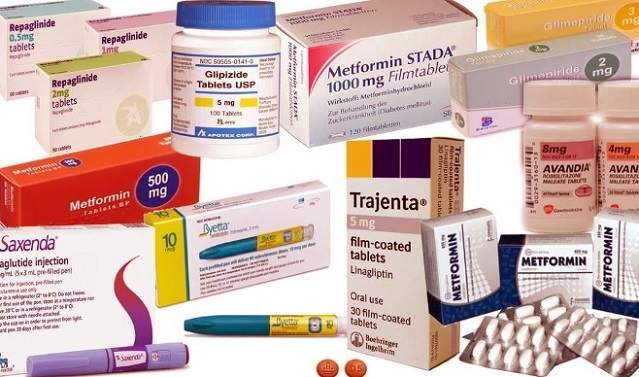Nikhil Prasad Fact checked by:Thailand Medical News Team Feb 13, 2025 2 months, 1 day, 10 hours, 26 minutes ago
Medical News: Exploring a New Approach to Parkinson’s Treatment
Parkinson’s disease (PD) is a progressive neurodegenerative disorder affecting millions worldwide, yet no cure currently exists. Researchers are continuously seeking innovative ways to slow its progression and improve patients’ quality of life. A recent study conducted by scientists from the Department of Biochemistry at Carol Davila University of Medicine and Pharmacy in Romania suggests that commonly used diabetes medications could be repurposed as a promising treatment for Parkinson’s disease.
 Repurposing Diabetes Drugs for Parkinson’s Disease
Repurposing Diabetes Drugs for Parkinson’s Disease
This
Medical News report highlights an intriguing connection between type 2 diabetes (T2D) and Parkinson’s disease. The research team found that these two seemingly unrelated conditions share several underlying pathological mechanisms, including oxidative stress, mitochondrial dysfunction, neuroinflammation, and ferroptosis - a form of iron-dependent cell death. By targeting these common pathways, diabetes drugs may hold the key to modifying the course of Parkinson’s disease, providing hope for millions of patients.
The Role of Ferroptosis in Parkinson’s Disease
Ferroptosis is a relatively new concept in neurodegenerative diseases. It involves the accumulation of free iron and the excessive oxidation of lipids in cells, leading to cell death. This process is now believed to contribute significantly to the degeneration of dopaminergic neurons in Parkinson’s patients. Until recently, ferroptosis had not been a primary focus in Parkinson’s research. However, with growing evidence linking it to the disease, scientists are now exploring ways to inhibit this damaging process.
The study examined the potential of several diabetes drugs in counteracting ferroptosis and protecting neurons. Among these medications, metformin, peroxisome proliferator-activated receptor gamma (PPAR-γ) agonists, sodium-glucose cotransporter-2 (SGLT2) inhibitors, incretin mimetics (such as GLP-1 receptor agonists), and dipeptidyl-peptidase 4 (DPP-4) inhibitors showed promising results. These drugs have already been widely used in diabetes treatment and possess well-established safety profiles, making them ideal candidates for repurposing.
Diabetes Medications with Neuroprotective Potential
-Metformin: A Multifaceted Drug
Metformin is one of the most commonly prescribed drugs for type 2 diabetes. It is known for its ability to improve insulin sensitivity, regulate glucose metabolism, and reduce oxidative stress. Recent findings suggest that metformin can also modulate mitochondrial function and inhibit ferroptosis. By enhancing antioxidant defenses and maintaining cellular energy balance, metformin may help protect neurons from degeneration in Parkinson’s disease.
-Incretin Mimetics and DPP-4 Inhibitors
Drugs that target the incretin system, such as GLP-1 receptor agonists and DPP-4 inhibitors, have shown neuroprote
ctive effects in preclinical and clinical studies. These medications enhance insulin signaling, reduce inflammation, and improve mitochondrial function. Notably, GLP-1 receptor agonists like liraglutide and exenatide have demonstrated potential in preventing dopaminergic neuron loss by mitigating ferroptosis-induced damage. Some clinical trials have already investigated these drugs for Parkinson’s, with early results suggesting benefits in motor function and cognitive health.
-PPAR-γ Agonists and SGLT2 Inhibitors
PPAR-γ agonists, such as pioglitazone, are another class of diabetes drugs that may have applications in Parkinson’s treatment. These drugs regulate inflammation, oxidative stress, and lipid metabolism, which are all implicated in the disease’s progression. Similarly, SGLT2 inhibitors, typically used to manage blood sugar levels, have been found to reduce oxidative stress and potentially protect neurons from ferroptotic damage.
The Need for Further Research
While preclinical studies and some clinical trials have shown promise, researchers caution that more extensive studies are needed to confirm these findings. Many of the clinical trials examining diabetes drugs for Parkinson’s have yielded mixed results, underscoring the complexity of the disease and the necessity for tailored treatment strategies. Understanding the precise mechanisms through which these medications affect Parkinson’s pathology will be critical in determining their efficacy and safety in long-term use.
Conclusion
The repurposing of diabetes drugs for Parkinson’s disease presents an exciting avenue for research and potential treatment. By targeting shared pathological mechanisms such as oxidative stress, mitochondrial dysfunction, neuroinflammation, and ferroptosis, these medications could offer a cost-effective and expedited alternative to traditional drug development. Given their well-established safety profiles, diabetes drugs could provide a more comprehensive approach to managing Parkinson’s disease, extending beyond symptom relief to modifying the disease’s course.
The study findings were published in the peer-reviewed International Journal of Molecular Sciences.
https://www.mdpi.com/1422-0067/26/4/1516
For the latest on Parkinson’s Disease, keep on logging to Thailand
Medical News.
Read Also:
https://www.thailandmedical.news/news/breaking-chinese-scientist-develop-wireless-based-nanoparticles-to-reverse-parkinson-s-disease-via-brain-stimulation
https://www.thailandmedical.news/news/understanding-how-mitochondrial-issues-may-fuel-memory-loss-in-parkinson-s-disease
https://www.thailandmedical.news/news/parkin-a-protein-associated-with-parkinson-s-disease-found-to-be-elevated-in-individuals-infected-with-covid-19
https://www.thailandmedical.news/news/study-shows-n-acetylcysteine-health-supplements-can-help-parkinson-s-disease-patients
Follow us on:
https://x.com/ThailandMedicaX
https://www.facebook.com/ThailandMedicalNews
https://bsky.app/profile/thailandmedical.bsky.social
https://gettr.com/user/thailandmedicalnews
https://www.tribel.com/thailandmedical/wall
and 33 other social media platforms
